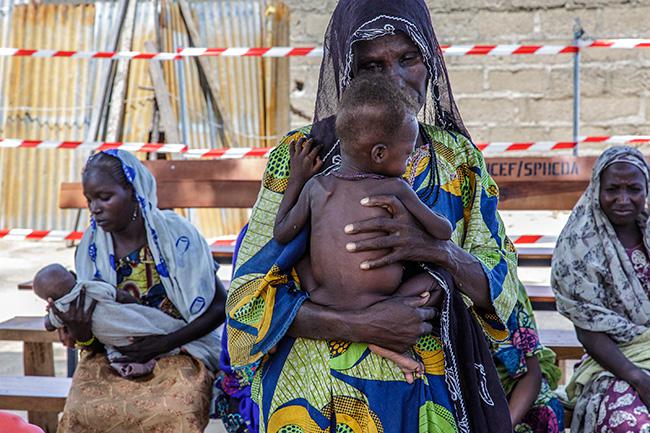
With previously inaccessible areas across north-east Nigeria opening up, an additional 750,000 people can now be reached. UNICEF is providing critical health and nutrition services to save lives, as well as education and child protection support to help children recover from the horrors they have lived through.
GWOZA/KONDUGA, Borno, Nigeria, 29 August 2016 – The Mandara mountains appear ominously on the horizon through the cockpit window. Clouds hang over the ridge that cuts across Nigeria’s north-east border with Cameroon.
At the foot of the range is Gwoza, a town at the centre of the conflict that has devastated Borno state. As we hover lower, a scene of destruction presents itself. Roof after roof ripped off, revealing hollowed out buildings, as if a tornado made its way through.
But on the ground, life seaps out of the ruins and urgent work goes on to save it.
Tackling a nutrition crisis
At the local health clinic, mothers focus on saving the lives of their malnourished babies and young children. Ali, 15-months-old, is one of them. His mother Zainab has been bringing him for treatment over the past three weeks.
“I’m trying to do what I can to make him stronger and there is some progress now,” she says. Health workers weigh Ali and administer ready-to-use therapeutic food.
“We’ve seen 4,000 patients in just eight weeks,” says Adong, a community volunteer who helps to identify and track children in need of medical care in the town. There are nearly a quarter of a million children with severe acute malnutriton across Borno state and without treatment some 49,000 will die.
When reached in time, a simple eight week course of the therapeutic food results in high recovery rates. UNICEF provides the nutritious treatment, as well as other essential medical supplies, to clinics across Borno. Training health workers to treat the acute cases in remote locations is also a critical part of the emergency response.
“Supporting local services like this is not only a matter of life or death but is vital for the future of the community and region,” says Jean Gough, UNICEF Nigeria Representative. “Without basic health facilities and access to safe water, families will be forced to uproot again,” she adds.
Saving lives and healing minds
At the ruins of a local primary school building, a group of young teenage boys are chatting among themselves. Most of them used to live in villages surrounding Gwoza but fled to the town for safety after the Nigerian military retook control in March 2015.
“Everything was destroyed in my village, the situation is not good here,” says 14-year-old Genesis. “I just stay with my friends,” he answers when asked about a typical day. One of them is Sodorong, a 13-year-old wearing a straw hat. “It was given to me and made by my friend,” he says proudly.
Sodorong lives with his grandmother and three siblings. “My father disappeared when they [Boko Haram] came during the trouble,” he says. His mother has since left Borno state with another man.
For children like Genesis and Sodorong, helping them to recover, heal and resume their childhoods is a priority, but little support has reached Gwoza prior to this trip.
“The first thing is to make sure critical lifesaving assistance is in place and then we must provide children with safe learning spaces and psychosocial support so they can move on from the atrocities they’ve been exposed to,” says Gough.
At a displaced persons camp in Konduga, some 35 kms southeast of Maiduguri city, the impact of such work is being felt. Children take part in structured recreational activities and two tents are packed full of 8- to 12-year-olds noisily chanting the alphabet. There is an energy that only children can create.
“We’re helping to provide a normal place for children here,” says Simon, a volunteer who lives in the small town and helps to register children for the activities. “They have been through so much back in the villages where they came from.”
Source: UNICEF
 FR
FR EN
EN AR
AR








